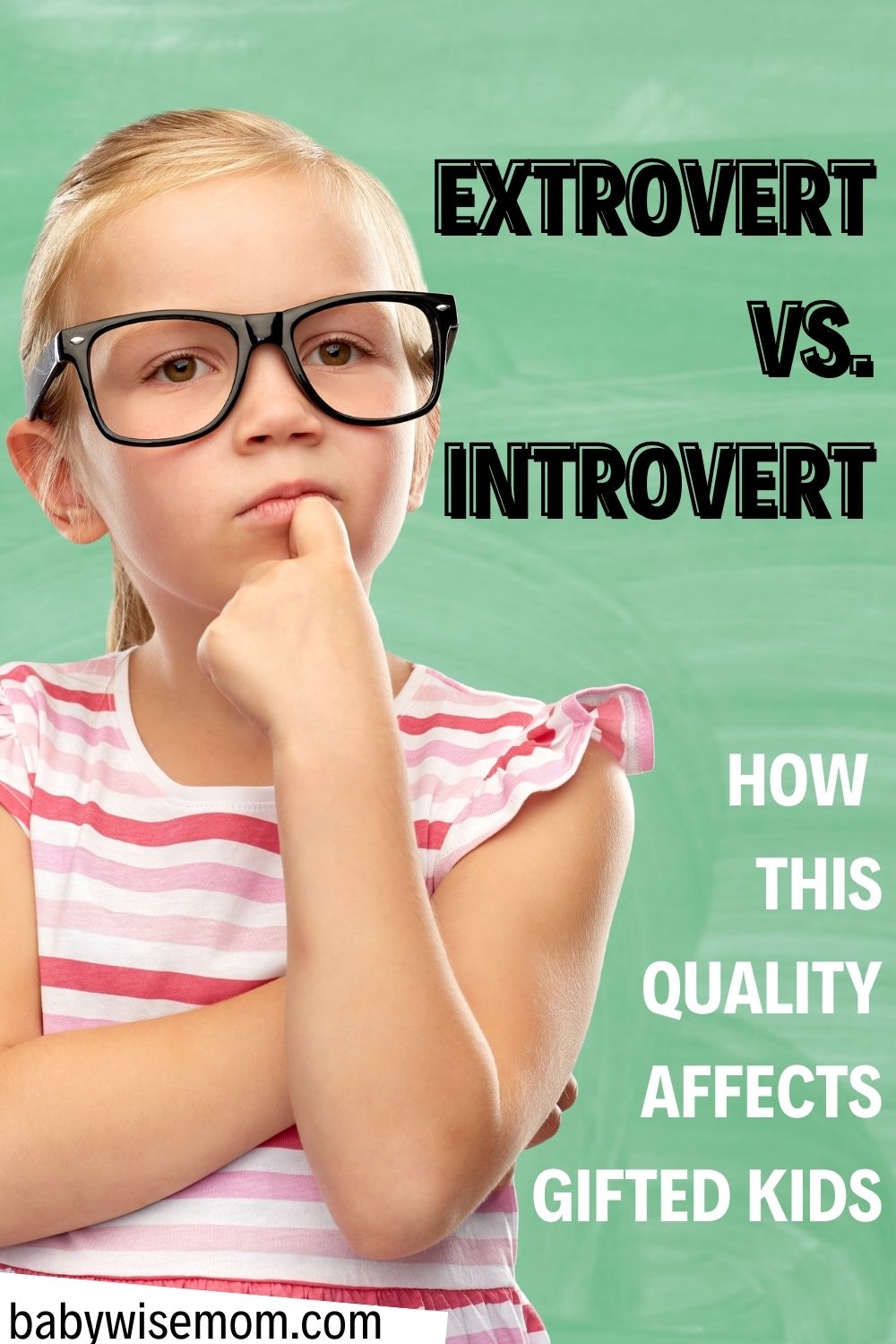How extroversion and introversion affect gifted students. Find out how your child will feel and behave at school and how you can help.

As a parent, we understand things our kids are going through that are similar to our own experiences. It can be pretty easy to know how to navigate our kids through these experiences.
It is much more difficult when they have a temperament different than our own. One of the most prominent qualities a child can have that is vastly different from your own is extroversion and introversion.
If you are an extrovert, you will struggle to understand your introvert and vice versa.
These two qualities have a stark impact on a gifted child and how they feel about school. It also greatly influences how they are socially at school and at home after school.
Let’s discuss some tendencies of each. You will find a lot of these are true regardless of giftedness. These are discussed in the book Emotional Intensity in Gifted Students in Chapter 4 and Chapter 8 (affiliate link).
Post Contents
Extrovert and Introvert Defined
I believe these qualities are better understood today than they have ever been.
Traditionally, people have assumed extroverts love people and introverts hate people. They have treated introversion as a character flaw that needs to be fixed.
This false assumption still exists today. My husband is an introvert, and anytime anyone finds that out, they comment, “But you are so good socially!”
Social skills have nothing to do with introvert/extrovert.
This is all about what you need to be rejuvenated.
An extrovert simply is energized by people. If an extrovert is feeling down or sluggish, social interaction will perk them right up.
Conversely, an introvert is energized and rejuvenated by being alone. They can absolutely love to be around people, but it exhausts them. They need time alone to get their energy back.
Gifted Extroverts
If your child is a gifted extrovert, you will find that school is quite invigorating for her. All of that interaction all day lifts her up. She will come home from school or another activity and want to chat all about it.
Your child wants social contact.
“Extroverts, well suited to the complex social nature of school, often find solace as it appeals to their innate need for social contact.”
page 97
Gifted extroverts process the world by talking. This is how they learn. They need to tell you all about it.
Because of this, a gifted extrovert is highly verbal.
Peers can often view gifted extroverts as bossy and know it alls. These kids can be quite rigid with the rules and with expectations.
They might not be good at taking turns and are unlikely to give others the chance to be in charge and decide what they will play.
It is important to realize these character traits in your child.
As a parent, you need to be really patient about listening to ALL OF THE DETAILS as your child shares them with you. She needs to share them to process.
You also need to recognize that there is a good chance your kiddo is a bossy overlord at school. If she comes home upset because no one wants to play with her or got in a fight at recess because her friends wouldn’t play her game, you need to recognize she is at least 50% responsible for it (probably more).
You can do a lot to work at home on taking turns and respecting the opinions of others.
So pay attention to how your child seeks her energy so you know how best to help her.
Your gifted extrovert is not doomed for social difficulty. But if you excuse her behavior and assume she is always picked on, social life will be much harder for her.
Gifted Introverts
Gifted introverts do not have it easy, either.
For the gifted introvert, school is exhausting.
“…gifted introverts typically require built-in periods of solitude. Cooling off periods, opportunities to decompress, and strengthening of a personal understanding of themselves is needed in order to mediate the frustrating world these children live in.”
page 98
This is something it took me a while to understand. I am an extrovert, so when my kids got home, I wanted to chat all about their day. My oldest two are introverts and just wanted some alone time.
I have learned to just greet them after school with a general “how was your day” and then wait to ask more after they have had some time alone.
At school, introverts will seek ways to rejuvenate. Many gifted kids will do this by escaping into a book. I recall Brayden and Katilyn having teachers comment they read during class a lot. Part of this is that they understood the concept and were bored, but it was also that they were trying to get some energy back.
In Kindergarten, Brayden would at times play alone at recess. This was distressing to his teacher. I didn’t worry about it. He was accustomed to having Independent Play each day. His best friend was in his class at school, so I wasn’t worried that he didn’t have anyone to play with. Looking back now, I understand that he just needed some time alone.
We really need to recognize this and be okay with it as extroverts. Gifted students are at risk of hating school because it is too easy. Gifted extroverts at least have the benefit of feeling rejuvenated by school. The gifted introvert can find it boring and exhausting.
Gifted introverts learn by observation. They can appear to be avoiding jumping into a situation and getting involved, but really they are just observing to figure it out first.
Gifted introverts can often appear to be rude and egotistical. They do not have to be shy to be an introvert. Those who aren’t shy often compensate by working to take control of their environment.
If your child is an introvert, do not make him feel like something is wrong with him for not wanting to be right in the middle of every activity. Be okay with him taking moments to be alone and reenergize. It will help him like school more and be ready to engage in learning.
Conclusion
As your child heads back to school, be aware of how your child rejuvenates and work with your child in that area. Help strengthen traits that need to be strengthened and help your child find ways to cope with things that are difficult. Gifted children are often unaware of their own behaviors, so parents really need to help them see what they are doing.
Related Posts
- 4 Common False Assumptions About Gifted Children
- Emotional Intensity in Gifted Students Book Review
- Addressing the Emotional Needs of a Gifted Child
- How To Teach a Gifted Child Communication Skills
- 15 Common Characteristics of Gifted Children

